Pamukkale, The Cotton Castle
Perched atop the picturesque Pamukkale in Turkey, the Cotton Castle creates a mesmerizing sight with its terraces of milky white mineral deposits. Beyond its stunning appearance lies a blend of history and natural allure that draws visitors from around the globe.
From the ancient ruins of Hierapolis to the inviting mineral-rich pools, Pamukkale offers a journey into the past while providing a rejuvenating experience in the present.
But what secrets lie beneath the surface of this captivating destination, waiting to be uncovered?
Key Points
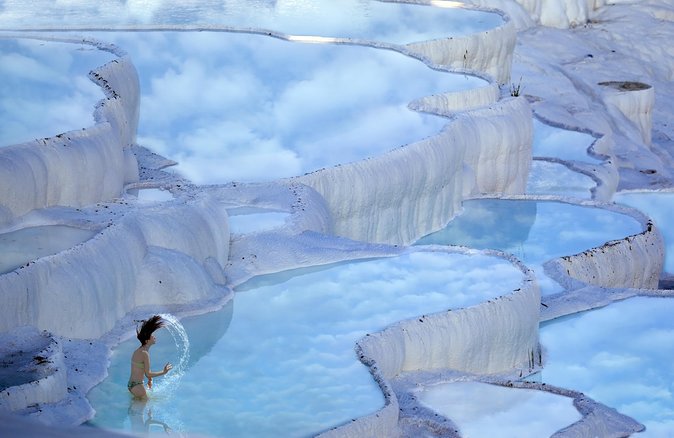
- Pamukkale boasts white terraces and thermal waters with rejuvenating health benefits.
- Hierapolis, nearby, features Roman, Hellenistic, and Byzantine structures.
- Pamukkale offers detoxification, skin cleansing, and muscle relaxation.
- Visitors can enjoy stunning landscapes, historical wonders, and local cuisine in Pamukkale.
Geology of Pamukkale
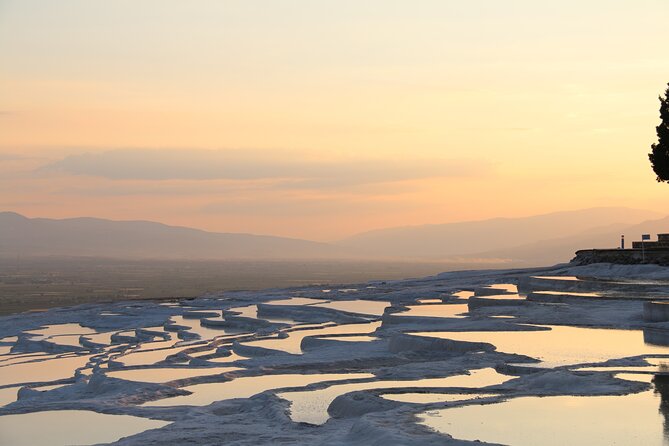
Nestled in southwestern Turkey, the geological wonder of Pamukkale captivates visitors with its stunning white terraces and mineral-rich thermal waters. The cotton formations, created over thousands of years by calcium-rich springs cascading down the mountainside, give the landscape an ethereal appearance.
These geological wonders aren’t only visually striking but also hold historical significance, as the Romans once revered Pamukkale for its healing properties. The terraces, formed by the interaction of hot spring waters with the air, continue to evolve, making each visit a unique experience.
Exploring Pamukkale’s intricate cotton formations and understanding the geological processes behind them offers a glimpse into the fascinating natural forces shaping this otherworldly destination.
History of Hierapolis
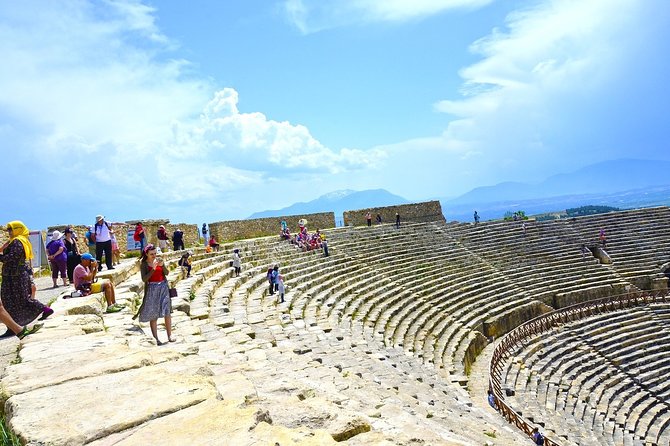
The historical site of Hierapolis, situated adjacent to the geological wonder of Pamukkale in southwestern Turkey, provides a window into the ancient civilizations that once thrived in this region.
Hierapolis, founded in the 2nd century BC, was a prominent city known for its thermal springs and healing centers. Excavation findings have unearthed well-preserved structures like the theater, necropolis, and Roman baths, shedding light on the city’s layout and daily life.
The city’s cultural significance is evident in its diverse architectural styles influenced by Roman, Hellenistic, and Byzantine periods. Hierapolis also held religious importance, with temples dedicated to various gods. The site’s historical depth and excavation discoveries continue to fascinate archaeologists and visitors alike.
Thermal Pools and Health Benefits
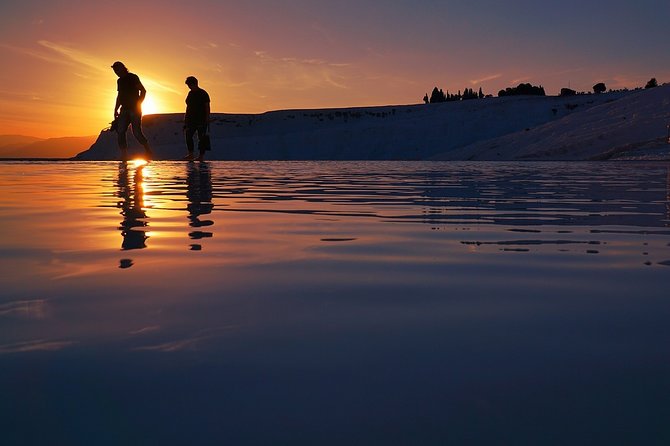
Surrounded by the stunning natural landscape of Pamukkale, the thermal pools offer visitors a rejuvenating experience with their reputed health benefits. The mineral-rich waters and picturesque surroundings provide a perfect setting for relaxation and wellness.
Here are some key points to consider:
- Detoxification: The thermal pools are believed to help in detoxifying the body and cleansing the skin.
- Muscle Relaxation: The warm waters can aid in relieving muscle tension and promoting relaxation.
- Improved Circulation: The mineral content in the pools may boost circulation, benefiting overall health.
- Skin Rejuvenation: The natural minerals are said to contribute to skin rejuvenation, leaving visitors with a healthy glow.
Visiting Tips and Recommendations
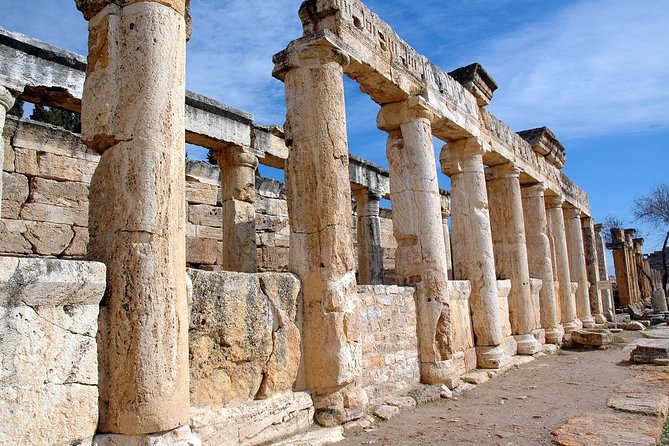
For a memorable visit to Pamukkale, consider these essential tips and recommendations to enhance your experience. When it comes to capturing the beauty of Pamukkale, make sure to visit the best photography spots like the terraces at sunrise or sunset for stunning shots. Plus, indulge in the local cuisine recommendations to savor the flavors of the region. Try traditional dishes like kebabs, gözleme, and baklava to truly learn about the culture. Here’s a helpful guide to make the most of your visit:
| Best Photography Spots | Local Cuisine Recommendations |
|---|---|
| Terraces at sunrise/sunset | Kebabs |
| Natural pools | Gözleme |
| Hierapolis ancient city | Baklava |
Sustainable Tourism Practices
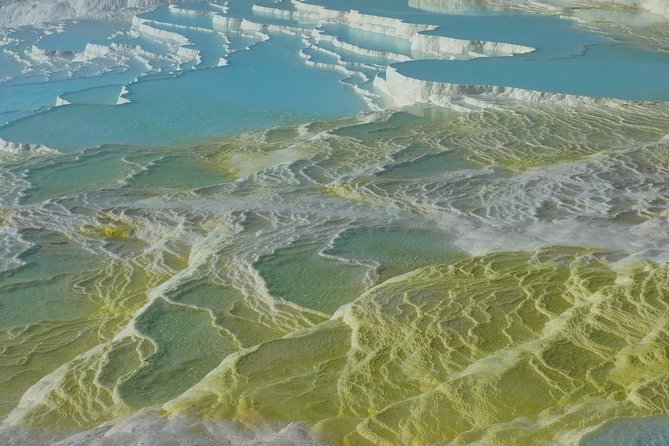
To promote environmental preservation and cultural respect, travelers to Pamukkale are encouraged to embrace sustainable tourism practices that minimize negative impacts on the delicate ecosystem and heritage sites.
It’s crucial to consider the following when visiting Pamukkale:
-
Environmental Impact: Reduce waste generation, avoid littering, and respect wildlife habitats.
-
Community Engagement: Support local businesses, respect local customs, and engage with the community in a responsible manner.
-
Resource Conservation: Conserve water, energy, and natural resources during your visit.
-
Cultural Preservation: Respect historical sites, artifacts, and traditions to ensure their preservation for future generations.
How to Get to Pamukkale
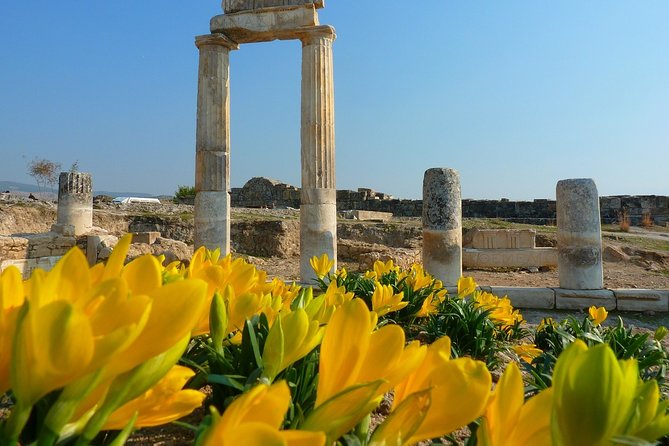
Reaching Pamukkale is a journey filled with stunning landscapes and historical wonders, making it a must-visit destination for travelers seeking natural beauty and cultural exploration.
Travel options to Pamukkale include flying into Denizli Cardak Airport, which is the closest airport to the region, followed by a short bus or taxi ride. Another popular choice is taking a bus from major cities like Istanbul, Antalya, or Izmir to Denizli, and then catching a local minibus or taxi to Pamukkale. Transportation routes are well-connected, offering visitors flexibility in planning their journey.
Once in Pamukkale, the enchanting Cotton Castle and the ancient ruins of Hierapolis are easily accessible, promising an unforgettable travel experience.
Common questions
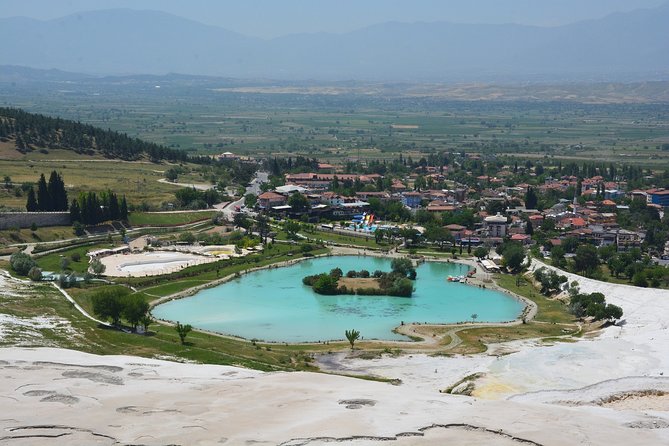
Can Visitors Swim in the Natural Pools at Pamukkale?
Visitors can enjoy swimming in the natural pools for relaxation and health benefits. The serene waters offer a unique experience, refreshing both body and mind. Enjoy the tranquil setting and reap the rejuvenating effects.
Are There Any Restrictions on the Use of Camera Equipment at the Site?
Photography regulations at the site include restrictions on certain equipment. Visitors must adhere to camera policies for preservation. It’s essential to clarify any restrictions beforehand to ensure a smooth experience while exploring the area.
What Is the Best Time of Year to Visit Pamukkale for Optimal Viewing Conditions?
For optimal viewing conditions and the best photography spots, the ideal time to visit Pamukkale is during the spring or fall when temperatures are moderate. This ensures clear skies, pleasant weather, and perfect lighting for capturing stunning images.
Are There Any Local Artisan Crafts or Products Available for Purchase Near the Site?
Local souvenirs and handmade crafts are plentiful near the site, offering travelers a chance to take home unique pieces of artistry. These artisan products showcase the region’s cultural heritage, making them meaningful keepsakes for visitors.
Are There Any Specific Dress Codes or Cultural Considerations to Keep in Mind When Visiting Pamukkale?
When visiting, travelers should note that dress codes and cultural considerations are crucial. Respect local customs by wearing modest attire, especially near religious sites. Being culturally sensitive enhances the experience and shows appreciation for the destination’s traditions.
Last Words
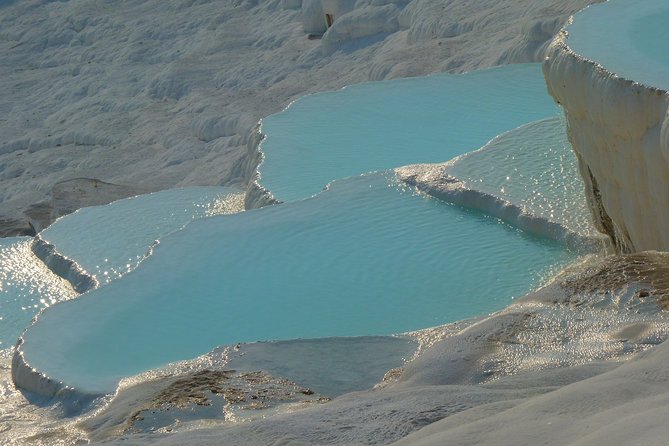
Experience the magic of Pamukkale, where nature‘s beauty meets ancient history in a surreal setting. From the stunning terraces of white calcium deposits to the therapeutic thermal pools, this destination offers a unique blend of relaxation and exploration.
Enjoy the rich heritage of Hierapolis and soak in the mineral-rich waters for a truly unforgettable travel experience. Pamukkale is a must-visit destination for those seeking a mix of history, nature, and relaxation.